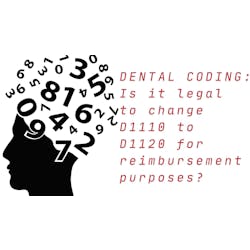by Dianne Glasscoe Watterson, RDH, BS, MBA
[email protected]
Dear Dianne,
Recently, I decided to leave the practice where I have worked for the past seven years to stay home with my 2-year-old daughter. I gave the doctor a two-week notice. Our office manual requires a two-week notice. Then the doctor called me at home to tell me not to come in the next Monday, as he had arranged a working interview with another hygienist.
Later, he called again to tell me not to come in on two other days that I was scheduled to work, due to working interviews. I was supposed to work eight more days, but now I’m only working five of those days. Then he had the audacity to ask me to fill in one day the following week.
I’m feeling jerked around! My question is this: Does an employee have any rights once notice is given? Should I expect to be paid on those days when I’ve been asked not to work due to working interviews?
Feeling Disrespected
Dear Feeling,
I detect a tinge of remorse over giving up your job. Are you having second thoughts? I’ll admit that it is a scary time to give up one’s job in this job market.
When you made the decision to give up your position in order to stay home with your child, you took a bold step. I commend you for putting the needs of your young daughter first, because as you probably have considered, you have such a short time to see that she feels loved, protected, and valued before she begins school. You’ll have plenty of time to work once she’s in school.
Further, when you gave your resignation, you probably realized that the doctor would want to narrow down his field of applicants by offering working interviews. Having an applicant work even a half-day can be a valuable time to gauge an applicant’s skill level, organization, general disposition, and chemistry (or lack thereof) with other employees.
Were you surprised over his request for you to take days off for this purpose? I feel certain he wanted to have someone ready to step in immediately upon your departure so as not to interrupt patient care and production, both of which are very important.
Since (I assume) you were not working under an explicit contract, there is no recourse if the employer decides to end your employment early or cut the remaining notice short. However, a court case in Connecticut awarded an employee his full gross pay for two weeks plus court costs when his employer cut the two-week notice short (Robert Lingenfelter v. Gerald Metals, Inc., CV010181883S). In this case, the defendant was terminated in a downsizing effort but was denied a two-week notice from the employer that his employment would end. The two-week clause was clearly stated in the Employee Handbook from the company.
Employers are free to accept a resignation when it is convenient for them and not necessarily when it is convenient for the employee. Many employers will pay an employee for the unworked notice, but they are not obligated by law to do so. It is legal for an employer to reduce the notice given by an employee, since there is no law prohibiting such action.
In some situations, an employer may decide to end an employee’s employment immediately upon notice for security reasons or workplace safety. After all, when an employee says, “I don’t want to work here anymore,” the office atmosphere quickly changes. Would it surprise you to learn that some employers are actually offended when staff members leave for almost any reason?
Staff turnover always causes a disruption in team dynamics, and there is the inconvenience of breaking in a new person. The two weeks following a notice can be a time of sadness and low morale. An employer can feel that the impending departure gives the employee little motivation to be productive.
Your post brings up an interesting concept — the working interview. Employers, including dentists, must realize that expecting anyone to work without the expectation of being paid is illegal. According to an article by Barbara Freet, PHR, called “Working Interviews: Dentists, Beware the Pitfalls!” too many dentists have found themselves in trouble with the labor commission over working interviews that were not compensated. The interviewee who sees live patients is considered an employee of the practice, even if the employment is only one day. The practice becomes liable for mistakes made by job candidates. Further, if the candidate is not hired, he/she may file for unemployment benefits, although benefits are not always granted in such situations.
At some point you may decide to re-enter the workforce. For you or any of your peers engaging in working interviews, here are a few guidelines that will reduce the chance of misunderstandings:
1. Be prepared for the doctor or office manager to vet your application thoroughly, including checking your references. Make sure those you choose for references can vouch for your work record and work ethics and will speak favorably of you.
2. If the interview process proceeds to a working interview, it is prudent to have something in writing regarding the time you are expected to be in the office providing treatment and the amount of pay you will receive. Some doctors offer less pay for a working interview than the going rate, which could be a red flag.
3. You should expect to be paid in full at the end of the workday. If you are scheduled to work more than one day, and your gross pay exceeds $600, it is required that the doctor withhold all applicable taxes. If your pay is under $600, you should receive a 1099 form from the office for tax purposes sometime near the tax deadline (January of the following year). It is not unreasonable to request that all remuneration be taxed, especially if you have been engaged in temporary work situations in several offices.
4. Whatever you do, do not be late! Arrive early so you can orient yourself to the operatory and go over the patient charts.
5. Avoid gaudy hairstyles, excessive jewelry, perfume, open-toe shoes, or casual attire. Above all, be sure to look professional.
6. Turn OFF your cell phone, and do not check for messages during the workday. If you are invited to lunch with the staff group, do not read messages while at lunch. Remember, you are being scrutinized and need to keep your focus on those who could be your coworkers.
7. Avoid controversial topics over lunch, and use NO profanity.
8. Write down some questions ahead of time for the doctor or office manager that you would like answered, such as what benefits you could expect, does the practice participate with any discount third-party plans, does the office ever go on any out-of-town trips, etc.
9. Be wary of vague promises, such as, “Yes, I plan to have a retirement plan in the future, but I’m not sure when that will be.”
I hope you enjoy your time at home with your little one. That time is sure to go by quickly! And when it is time for you to return to dental hygiene, understand that a working interview can help you and a potential employer decide if the position is a good fit.
Best wishes,
Dianne
Dianne Glasscoe Watterson, RDH, BS, MBA, is a professional speaker, writer, and consultant to dental practices across the United States. Dianne’s new book, “The Consummate Dental Hygienist: Solutions for Challenging Workplace Issues,” is now available on her website. To contact her for speaking or consulting, call (301) 874-5240 or email [email protected]. Visit her website at www.professionaldentalmgmt.com.
Past RDH Issues





